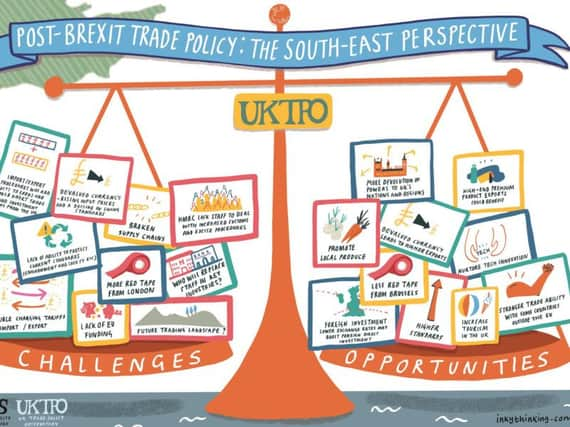University research highlights pros and cons of Brexit for South East


With the general election only days away, and with Brexit at the centre of the election debate, economists and lawyers from the UK Trade Policy Observatory (UKTPO) based at the University of Sussex have been exploring the key issues for post-Brexit trade policy for the South East region.
Through discussion with government departments, local businesses and civil society organisations, UKTPO asked residents to identify the key challenges and opportunities for trade for the South East region as a result of Brexit.
Advertisement
Hide AdAdvertisement
Hide AdThe research found that although people saw an opportunity post-Brexit for tourism and high-end exports in the South East, there is growing concern about the 'logistical headache' of potentially increased customs and immigration checks at South East airports, seaports and the Channel Tunnel.
Presented in an illustrative graphic (above), the key challenges identified by the research relate to the services and logistics industries, while key local opportunities include tourism.
UKTPO said South East England is one of the UK’s most successful regions, and according to the Office for National Statistics (ONS), gross disposable income per person is £20,434 - the second highest after London (the national average income per head is £17,965). This income is not generated by a large manufacturing sector but by an extensive services sector, UKTPO said.
According to the ONS, the South East has around 38,000 people employed in the financial sector, and the region would be directly exposed to potential job losses resulting from banks and insurers relocating to EU member states to retain market access.However, Brexit will have another (indirect) impact on many service suppliers in the South East, UKTPO said, as many services ‘piggyback’ on manufacturing and agriculture, so any serious loss of EU market access for manufacturing, even for firms elsewhere in the country, would have a significant impact on the demand for services from the south east.
Advertisement
Hide AdAdvertisement
Hide AdProfessor L. Alan Winters, Director of UKTPO said: “Consultation is a key ingredient in the formulation of good policy.
“From our conversations with people in our local area, we were able to understand how future policies would impact on key sectors of our local economy as well as nationally.
“In order to ensure that new trade policies are constructed in a manner that benefits all, it is important that policy makers engage with and listen to society.”
For more research by the UK Trade Policy Observatory, click here.